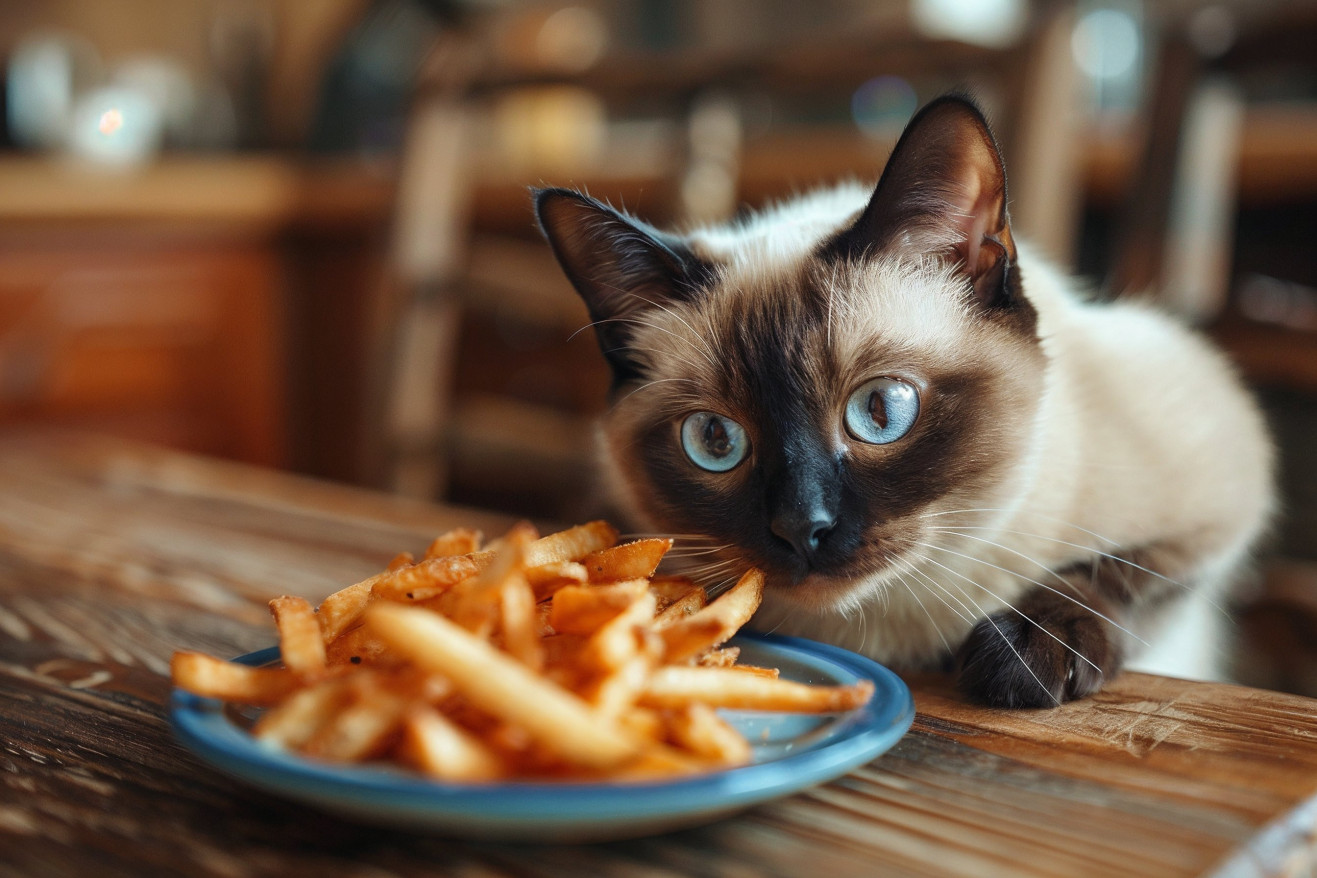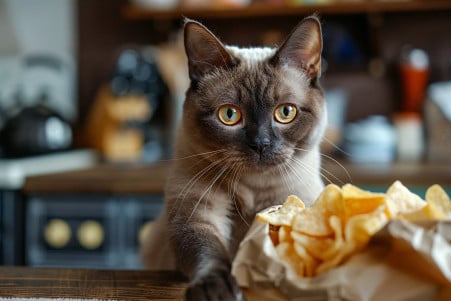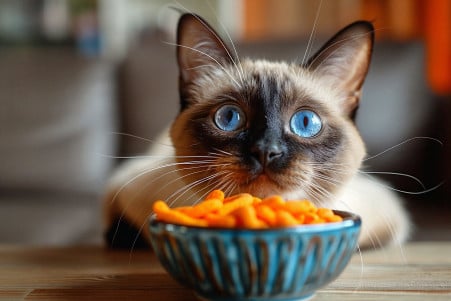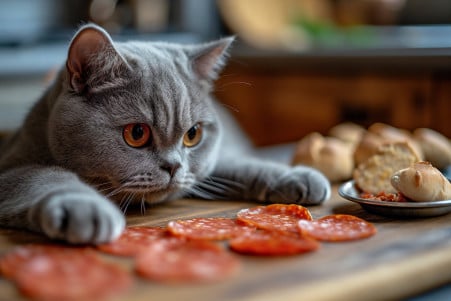Can Cats Have French Fries? What You Need to Know
17 February 2024 • Updated 16 February 2024

French fries are a popular treat, but can your cat partake in this snack with you? While not poisonous, French fries are not good for cats. They are high in fat and salt, which can lead to a number of health problems including obesity and gastrointestinal issues. Cats are obligate carnivores, which means they need a diet that is high in protein, not the carbs and spices that are in French fries.
This article will use information from veterinarians and research on nutrition to explain why French fries don’t meet a cat’s dietary requirements. It will also look at the health problems that can arise from feeding cats human food and the dangers of some of the most common spices.
Finally, it will put this information in the context of feline nutrition and look at the dangers of obesity in pets that are tied to their diet. By the end of this article, you will have a good understanding of how to make the best choices for your cat’s health and nutrition.
Can cats have french fries?
The Nutritional Gap: Why Cats Can’t Have Fries
To understand why cats can’t eat fries, it’s important to first understand the concept of obligate carnivores. While humans can eat a wide range of foods, cats are obligate carnivores, which means their digestive systems are specifically adapted to process animal protein, not plant-based foods like potatoes, the main ingredient in fries.
According to PetMD, a cat’s diet should be high in protein and include the right balance of fats, with carbohydrates making up only a small part of their nutritional intake. Fries, on the other hand, have no nutritional value for cats and can cause health problems because they are high in carbohydrates and fats.
Fries do not meet any of the dietary requirements for cats set by the Association of American Feed Control Officials (AAFCO). Fries are high in calories and fat, which can lead to obesity, diabetes, and joint problems, according to vet-reviewed information from Hepper. Because cats require a diet that is high in protein, fries are not only nutritionally void for cats, they are also potentially harmful to their health.
It’s important to make sure that cats are eating a diet that is tailored to their biological needs. To ensure that cats are healthy and avoid diet-related health issues, it’s important to feed them foods that are consistent with their natural diet, which is high in protein and low in carbohydrates.
Toxic Seasonings: The Hidden Dangers in Human Foods
While the occasional French fry may not have an immediate impact on your cat, the seasonings that are often added to this popular snack can be dangerous. Many of the seasonings that are added to French fries, including garlic and onions, are toxic to cats and can cause anemia and damage to red blood cells, according to articles on Medium and the Pet Poison Helpline.
Cinnamon, while not toxic in small doses, can be dangerous in concentrated forms like essential oils.
In addition to the health risks associated with the seasonings that are added to French fries, cats that consume these seasonings can also experience a range of symptoms from stomach upset to liver toxicity, especially from the consumption of spices like cloves and allspice, which contain eugenol, according to Dutch.
If you think your cat has consumed seasonings that may be toxic, contact your vet or a pet poison control center right away. You can also help to prevent this by keeping seasoned foods out of your cat’s reach and making sure that the plants and herbs in your cat’s environment are safe for them to explore.
By being mindful of the foods we give our cats, we can help to ensure that they stay healthy and happy.
Feline Metabolism: Designed for a Carnivorous Diet
Cats have a metabolism that is adapted to a carnivorous diet. While humans can metabolize a wide range of foods, cats have evolved to metabolize animal fats and proteins efficiently and have a limited ability to metabolize carbohydrates.
A study in the British Journal of Nutrition explains that feral cats eat a diet that is high in protein and fat and low in carbohydrates, and domestic cats have not evolved away from this metabolic preference.
Feeding cats a diet that is high in carbohydrates, like French fries, can lead to health problems like obesity and diabetes mellitus. Cats have low levels of amylase, the enzyme that breaks down the starches in carbohydrates like French fries, according to a study in PMC. Their livers also have low levels of glucokinase activity, an enzyme that is important in carbohydrate metabolism in other species, according to an article on ScienceDirect.
This makes it important to feed cats a diet that is in line with their metabolic needs. An ideal diet for cats would be high in protein and low in carbohydrates, which would support their metabolism and help them avoid the health problems that come with feeding them an inappropriate diet. It’s important to feed cats a diet that is appropriate for their species in order to keep them healthy and thriving.
Preventing Feline Obesity: How to Avoid Overfeeding Your Cat
Obesity in pets has become an epidemic, with a study in Today’s Veterinary Practice estimating that 25% to 30% of cats in the developed world are obese. In addition to reducing a cat’s lifespan, obesity can lead to serious health problems like diabetes mellitus and hepatic lipidosis. Feeding cats high-calorie human foods, like french fries, only makes the problem worse by providing empty calories that lack essential nutrients.
When it comes to helping cats lose weight, one-size-fits-all solutions won’t work, says Dr. Justin Shmalberg of the University of Florida College of Veterinary Medicine. For example, when cats are put on a weight loss diet, it’s important that the diet be high in protein to avoid nutrient deficiencies and to help maintain lean body mass. Diet and exercise are both important, but diet is especially key to keeping cats at a healthy weight.
Regular vet visits are also important for monitoring a cat’s weight and overall health. A study in PMC found that only about half of the pets put on a weight loss plan by their vet reached their target weight, showing the importance of ongoing professional monitoring.
With a combination of a balanced diet, exercise, and regular vet visits, cat owners can help ensure their pets don’t become obese and suffer the health problems that come with it.
Final Thoughts on Feline Nutrition: The Dangers of a Potato-Based Treat
Our exploration of the nutritional qualities of feline diets makes it clear that fries are a long way from the best treat for your cat. Lacking in nutrition and posing risks that include obesity, seasoning toxicity, and metabolic incompatibility, there is no reason to feed your cat fries.
Purina stresses the importance of keeping your cat at an ideal body condition through a complete and balanced diet, and it warns against the dangers of feeding your cat human food like fries that can lead to excessive calorie intake.
Being a responsible pet owner means understanding what makes a diet nutritious and safe for your cat. A species-appropriate diet that is high in protein and low in carbohydrates meets your cat’s biological needs and supports their health and well-being. Research in PubMed by Dr. Alexander J German shows that pet obesity is an increasing problem and that it’s important to make sure that you’re making the best choices for your pet’s diet.
We urge pet owners to partner with their veterinarians to develop a diet that is tailored to their pet and that is based on science and a genuine love for their cats. After all, the best treat for your cat is one that supports their health and helps them live their best life by your side.


